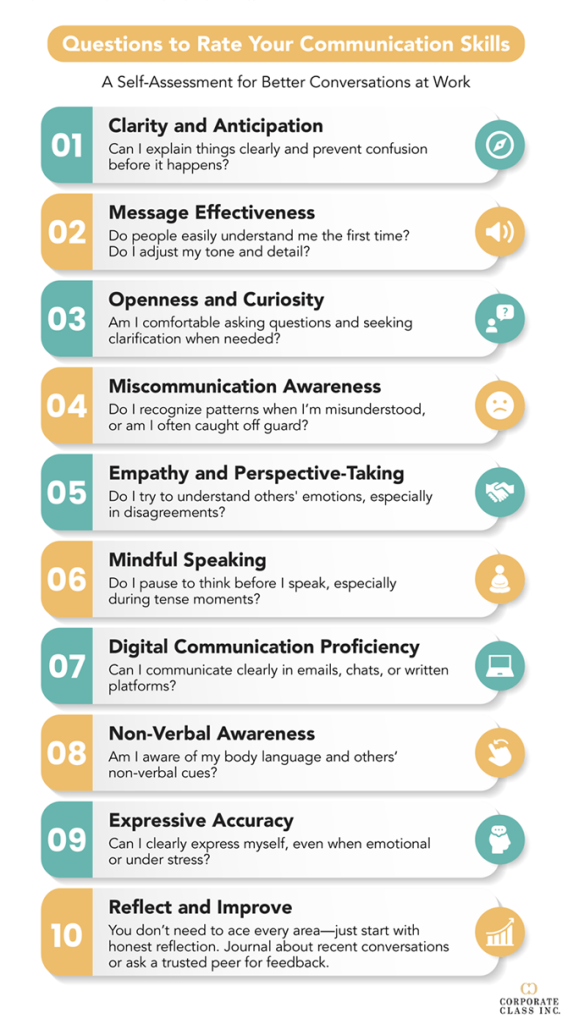To assess your interpersonal communication skills, start by evaluating how clearly you express your thoughts, how well you listen, and how effectively you respond in conversations. Strong communication isn’t just about talking, it includes reading non-verbal cues, managing your tone, and making sure your message is understood. This guide will walk you through practical ways to identify strengths and improve weak spots, so you can build better connections in both personal and professional settings.
Key Takeaways
- Understanding how you express yourself, and how others perceive you, is the first step to becoming a better communicator.
- Practicing active listening, managing emotions, and observing skilled communicators can help you build stronger, more authentic connections.
- Clear, confident communication helps you build trust, navigate challenges, and stand out as a leader in any professional environment.
What Are Interpersonal Communication Skills?
Interpersonal communication refers to how you engage with people through both spoken language and non-verbal behaviour. These skills shape how effectively you collaborate in teams, connect with clients, lead initiatives, manage conflicts, and build long-term professional relationships.
Improving your ability to communicate with clarity, empathy, and confidence can lead to significant growth in how you express ideas, listen actively, and respond thoughtfully. By assessing how you interact in various settings, you create the opportunity to strengthen both your personal connections and career trajectory.
Self-Assessment: How Strong Are Your Interpersonal Communication Skills?
Assessing your communication skills isn’t just about identifying flaws; it’s about becoming more self-aware, empathetic, and intentional in your daily interactions. Begin with a reflective mindset and answer these questions honestly. Consider writing down your thoughts or journaling about specific conversations you’ve had recently.

Here are key questions to guide your assessment:
Clarity and Anticipation
Can I anticipate confusion or miscommunication before it happens? Do I provide enough context when explaining ideas or giving instructions? These questions help you evaluate how proactive and thoughtful you are when sharing information.
Message Effectiveness
Do people regularly understand my messages the first time? Do I adjust my level of detail or tone based on the audience? Reflecting on this highlights your ability to tailor your communication to meet others’ needs.
Openness and Curiosity
Do I feel comfortable asking questions when I don’t understand something? How often do I seek clarification versus pretending to understand? This checks your willingness to stay engaged and clarifies for mutual understanding.
Miscommunication Awareness
Do I notice patterns in how people misinterpret me? Am I often surprised by misunderstandings? These questions help you recognize recurring gaps between what you say and what others perceive.
Empathy and Perspective-Taking
Can I put myself in someone else’s shoes during conversations, especially during disagreements? This reveals how well you acknowledge and consider the emotions and viewpoints of others.
Mindful Speaking
Do I pause and think about how my words will be received, or do I tend to speak reactively? Your answer uncovers how much thought you put into the timing, tone, and impact of your words.
Digital Communication Proficiency
How effective am I at communicating clearly through text-based platforms like email, chat, or project management tools? This helps you assess how well you express ideas and expectations in writing.
Non-Verbal Awareness
Am I aware of my own body language, and can I read subtle cues in others, such as tone shifts or facial expressions? This checks your skill in interpreting and controlling unspoken signals that influence conversations.
Expressive Accuracy
Do I struggle to articulate my ideas clearly, especially when I’m emotional or under pressure? This helps identify emotional states that interfere with your ability to communicate precisely.
If you struggle to answer some of these questions or find gaps in your abilities, that’s perfectly normal. Even highly skilled communicators have blind spots. The goal isn’t perfection, it’s progress. Regularly assessing yourself helps you identify recurring communication challenges and become more intentional in how you express and interpret messages.
For deeper insight, consider asking for feedback from coworkers, mentors, or close friends. They can often highlight strengths and areas for improvement that you may not notice yourself.
Why Interpersonal Communication Skills Matter in Your Career
Interpersonal communication is one of the most in-demand skill sets in today’s professional environment. How you interact with colleagues, clients, and supervisors can influence your career growth just as much as technical expertise. People with strong communication skills are more likely to be seen as leaders, collaborators, and problem-solvers, qualities that organizations actively seek and reward.
Improving your communication skills can directly impact your ability to:
- Advance in your career by articulating your value and building influence
- Build stronger workplace relationships built on trust, clarity, and respect
- Win over clients and customers through clear, persuasive messaging
- Negotiate more effectively by understanding both sides and presenting compelling arguments
- Resolve conflicts with confidence and empathy, leading to better team morale and outcomes
The modern workplace values emotional intelligence, adaptability, and the ability to work well across diverse teams. Being a strong communicator enhances your credibility and makes you more adaptable to various roles and responsibilities. It is a skill set that grows your potential and sets you apart in any industry.
3 Key Interpersonal Skills to Develop
Mastering interpersonal communication involves a mix of intentional practice, emotional intelligence, and self-awareness. These core skills form the foundation of every meaningful conversation, even if you’re presenting in a boardroom, mentoring a team member, or resolving a disagreement. Developing them not only boosts your confidence but also enables you to navigate complex social dynamics with clarity and empathy.
Focusing on these core areas can help you grow into a more effective communicator:
1. Verbal Communication
This involves more than just talking. It’s about choosing the right tone, vocabulary, and level of detail for your audience and situation.
Example: You’d use a different language when presenting a marketing pitch to executives versus explaining a process to a new hire.
2. Active Listening
Strong communicators don’t just talk, they listen. This means:
- Listening to facts, emotions and mindset
- Maintaining eye contact
- Nodding or using affirmative responses
- Avoiding interruptions
- Asking clarifying questions
3. Body Language Awareness
Your non-verbal signals often speak louder than words. Open and confident body language includes:
- Relaxed posture
- Steady eye contact
- Smiling when appropriate
- Uncrossed arms and hands are visible
On the other hand, fidgeting, crossed arms, and looking away may signal discomfort or disinterest.
How to Improve Your Interpersonal Communication Skills
Improving your interpersonal communication is a continuous process that requires deliberate effort and self-reflection. You don’t have to be perfect to be effective, but being intentional about how you interact with others can create meaningful changes in your relationships and career. You may already have experience and now want to sharpen specific skills. Whatever the case, these practical steps will guide you toward noticeable improvement.
Identify Your Weak Spots
Start by reviewing your self-assessment answers. Pinpoint the moments where communication tends to break down, maybe it’s during group discussions, written exchanges, or emotionally charged conversations. Recognizing these gaps is the first step toward targeted improvement.
Observe Strong Communicators
Look for role models in your environment, managers, colleagues, speakers, who communicate effectively. Pay attention to their tone, pacing, choice of words, body language, and how they adapt their style depending on who they’re speaking to. Note what you can emulate in your own style.
Manage Your Emotions
Self-regulation is a cornerstone of strong communication. When emotions run high, your message can easily become clouded or misinterpreted. Practice techniques such as pausing before responding, breathing deeply, or reframing negative thoughts to stay composed and constructive.
Reflect on Past Interactions
Review previous conversations that felt successful or challenging. What contributed to those outcomes? Were there missed opportunities to listen better, clarify your message, or respond with empathy? These insights can guide how you approach future interactions.
Practice Often
Communication is like a muscle; the more you use it, the stronger it gets. Look for opportunities to practice: speak up in meetings, engage in discussions, roleplay difficult conversations, or rehearse presentations. Practice builds confidence and improves clarity.
Seek Feedback
Ask trusted peers, mentors, or supervisors for honest feedback on your communication style. What do you do well? What could you improve? Be open to constructive criticism and view it as a tool for growth, not a personal critique.
Final Thoughts: Start Strengthening Your Communication Today
Interpersonal skills don’t improve overnight, but consistent effort pays off. Begin by reflecting on your communication habits, commit to learning, and make small, daily improvements. You’ll build stronger relationships, collaborate more effectively, and position yourself as a confident communicator in any setting.
Unlock Executive Clarity in 20 Minutes
You make high-stakes decisions daily. This free assessment reveals the unseen patterns driving - or derailing - your leadership performance.





